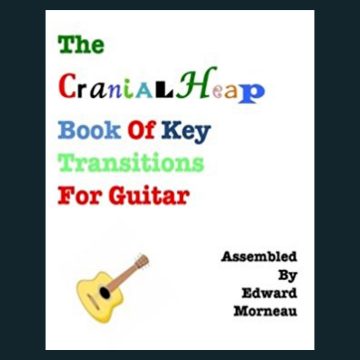Publication Date: February 1, 2016
Purchase Book

For those guitarists who have a basic understanding of chords and an appreciation that the voice often goes its own way in searching for appropriate keys in which to sing, this little guide will help you to transition from one key to another.
The capo does a good job in changing keys, obviously; however, this guide helps you find the chords much faster, even when you have to change the form of the chord. In terms of minor, 6th, 7th, 9th, 11th, 13th, diminished, augmented, and suspended chords in flat and sharp constructions, a good chord book will guide you through what notes to move, add and drop. To this effect I included an image of all the notes on a guitar neck as well as a chart of basic chords at the end of every transition section. For the beginner, know that sharps (#) have corresponding flats (b), and that a sharp is a half step above a basic chord, with the exception of B to C and E to F, which are considered full steps (even though the chord only moves up one fret.
